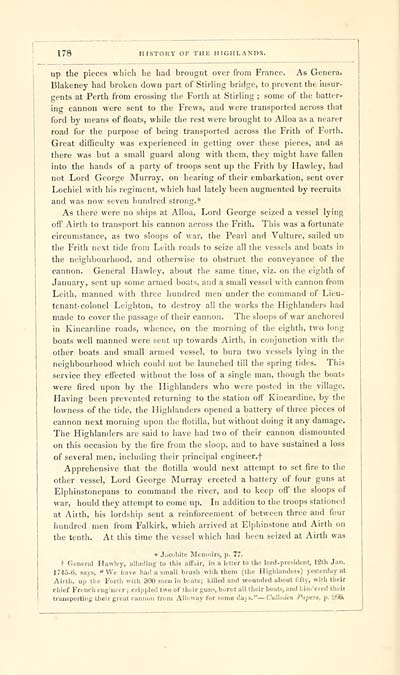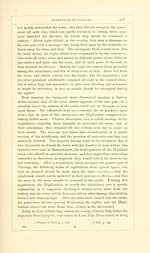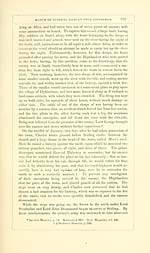Download files
Complete book:
Individual page:
Thumbnail gallery: Grid view | List view

178 HISTORY OF THE HIGHLANDS.
up the pieces which he had brougnt over from France. As General
Blakeney had broken down part of Stirling bridge, to prevent the insur-
gents at Perth from crossing the Forth at Stirling ; some of the batter-
ing cannon were sent to the Frews, and were transported across that
ford by means of floats, while the rest were brought to Alloa as a nearer
road for the purpose of being transported across the Frith of Forth.
Great difficulty was experienced in getting over these pieces, and as
there was but a small guard along with them, they might have fallen
into the hands of a party of troops sent up the Frith by Hawley, had
not Lord George Murray, on hearing of their embarkation, sent over
Lochiel with his regiment, which had lately been augmented by recruits
and was now seven hundred strong.*
As there were no ships at Alloa, Lord George seized a vessel lying
off Airth to transport his cannon across the Frith. This was a fortunate
circumstance, as two sloops of war, the Pearl and Vulture, sailed uo
the Frith next tide from Leith roads to seize all the vessels and boats in
the neighbourhood, and otherwise to obstruct the conveyance of the
cannon. General Hawley, about the same time, viz. on the eighth of
January, sent up some armed boat-:, and a small vessel with cannon from
Leith, manned with three hundred men under the command of Lieu-
tenant-colonel Leighton, to destroy all the works the Highlanders had
made to cover the passage of their cannon. The sloops of war anchored
in Kincardine roads, whence, on the morning of the eighth, two long
boats well manned were sent up towards Airth, in conjunction with the
other boats and small armed vessel, to burn two vessels lying in the
neighbourhood which could not be launched till the spring tides. This
service they effected without the loss of a single man, though the boati
were fired upon by the Highlanders who were posted in the village.
Having been prevented returning to the station off Kincardine, by the
lowness of the tide, the Highlanders opened a battery of three pieces of
cannon next morning upon the flotilla, but without doing it any damage.
The Highlanders are said to have had two of their cannon dismounted
on this occasion by the fire from the sloop, and to have sustained a loss
of several men, including tlieir principal engineer.f
Apprehensive that the flotilla would next attempt to set fire to the
other vessel, Lord George Murray erected a battery of four guns at
Elphinstonepans to command the river, and to keep off the sloops of
war, hould they attempt to come up. In addition to the troops stationed
at Aiith, his lordship sent a reinforcement of between three and four
hundred men from Falkirk, which arrived at Elphinstone and Airth on
the tenth. At this time the vessel which had been seized at Airth was
• .Incubite Memoirs, p. 77-
+ General Hawley, lilliuling to ttiis affiiir, in a letter to iho Inrd-presiilent, 12lli Jan.
1745-6, says, "We liave liaci u small brush with them (the Highlanduts) yesterday at
Aijtb, up the Forth with 3(X) men in buats; killed and wounded about lifty, with tlicir
chief French engineer; crippled two of their guns, burnt all their boaU.and hiiu'ered theii
transporting tJieir great cannon t'rom Alluway for some da\s." — Culhden Papers, p. i'itk
up the pieces which he had brougnt over from France. As General
Blakeney had broken down part of Stirling bridge, to prevent the insur-
gents at Perth from crossing the Forth at Stirling ; some of the batter-
ing cannon were sent to the Frews, and were transported across that
ford by means of floats, while the rest were brought to Alloa as a nearer
road for the purpose of being transported across the Frith of Forth.
Great difficulty was experienced in getting over these pieces, and as
there was but a small guard along with them, they might have fallen
into the hands of a party of troops sent up the Frith by Hawley, had
not Lord George Murray, on hearing of their embarkation, sent over
Lochiel with his regiment, which had lately been augmented by recruits
and was now seven hundred strong.*
As there were no ships at Alloa, Lord George seized a vessel lying
off Airth to transport his cannon across the Frith. This was a fortunate
circumstance, as two sloops of war, the Pearl and Vulture, sailed uo
the Frith next tide from Leith roads to seize all the vessels and boats in
the neighbourhood, and otherwise to obstruct the conveyance of the
cannon. General Hawley, about the same time, viz. on the eighth of
January, sent up some armed boat-:, and a small vessel with cannon from
Leith, manned with three hundred men under the command of Lieu-
tenant-colonel Leighton, to destroy all the works the Highlanders had
made to cover the passage of their cannon. The sloops of war anchored
in Kincardine roads, whence, on the morning of the eighth, two long
boats well manned were sent up towards Airth, in conjunction with the
other boats and small armed vessel, to burn two vessels lying in the
neighbourhood which could not be launched till the spring tides. This
service they effected without the loss of a single man, though the boati
were fired upon by the Highlanders who were posted in the village.
Having been prevented returning to the station off Kincardine, by the
lowness of the tide, the Highlanders opened a battery of three pieces of
cannon next morning upon the flotilla, but without doing it any damage.
The Highlanders are said to have had two of their cannon dismounted
on this occasion by the fire from the sloop, and to have sustained a loss
of several men, including tlieir principal engineer.f
Apprehensive that the flotilla would next attempt to set fire to the
other vessel, Lord George Murray erected a battery of four guns at
Elphinstonepans to command the river, and to keep off the sloops of
war, hould they attempt to come up. In addition to the troops stationed
at Aiith, his lordship sent a reinforcement of between three and four
hundred men from Falkirk, which arrived at Elphinstone and Airth on
the tenth. At this time the vessel which had been seized at Airth was
• .Incubite Memoirs, p. 77-
+ General Hawley, lilliuling to ttiis affiiir, in a letter to iho Inrd-presiilent, 12lli Jan.
1745-6, says, "We liave liaci u small brush with them (the Highlanduts) yesterday at
Aijtb, up the Forth with 3(X) men in buats; killed and wounded about lifty, with tlicir
chief French engineer; crippled two of their guns, burnt all their boaU.and hiiu'ered theii
transporting tJieir great cannon t'rom Alluway for some da\s." — Culhden Papers, p. i'itk
Set display mode to: Large image | Transcription
Images and transcriptions on this page, including medium image downloads, may be used under the Creative Commons Attribution 4.0 International Licence unless otherwise stated. ![]()
| Early Gaelic Book Collections > Ossian Collection > History of the Highlands and of the Highland clans > Volume 3 > (208) |
|---|
| Permanent URL | https://digital.nls.uk/79654918 |
|---|
| Description | Vol. III. |
|---|---|
| Shelfmark | Oss.249 |
| Attribution and copyright: |
|
| Description | Selected books from the Ossian Collection of 327 volumes, originally assembled by J. Norman Methven of Perth. Different editions and translations of James MacPherson's epic poem 'Ossian', some with a map of the 'Kingdom of Connor'. Also secondary material relating to Ossianic poetry and the Ossian controversy. |
|---|
| Description | Selected items from five 'Special and Named Printed Collections'. Includes books in Gaelic and other Celtic languages, works about the Gaels, their languages, literature, culture and history. |
|---|

